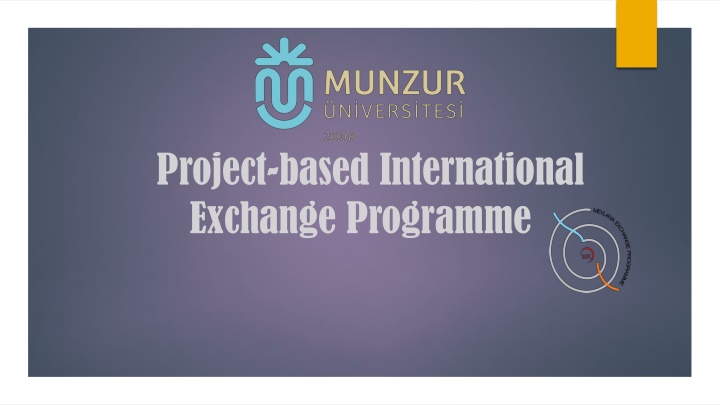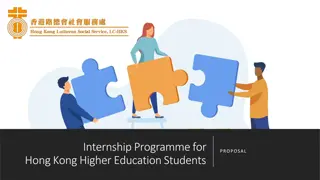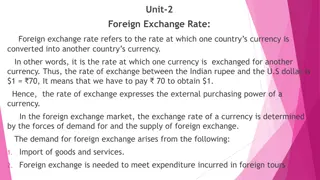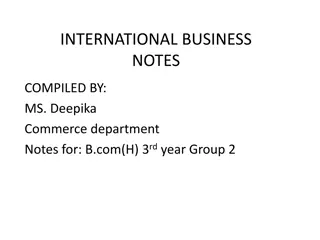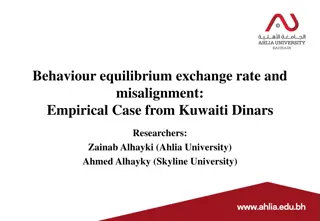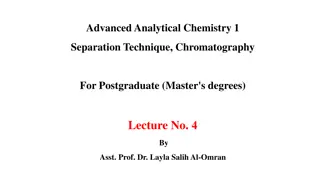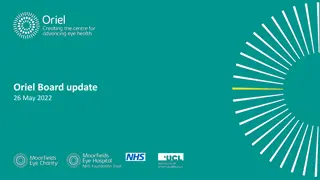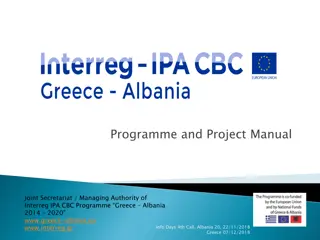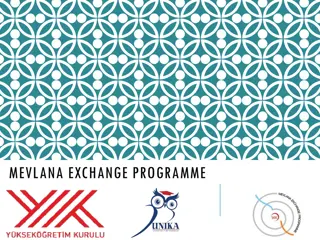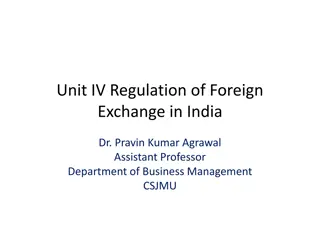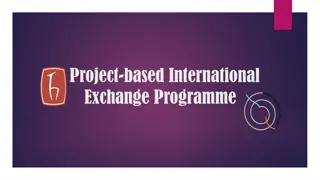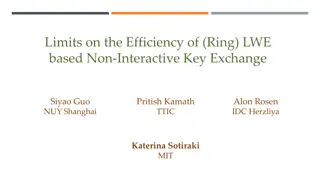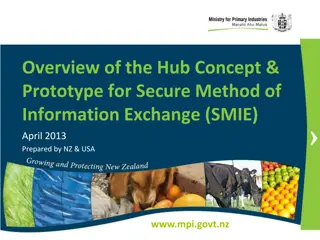Project-Based International Exchange Programme Overview
This programme facilitates cooperation between higher education institutions to enhance the internationalization of the higher education system. Initiated in 2016, it allows exchange of students and academic staff across various regions with specific scholarships and daily wages. The programme aims to promote quality in international education through field-oriented projects without country restrictions.
Download Presentation

Please find below an Image/Link to download the presentation.
The content on the website is provided AS IS for your information and personal use only. It may not be sold, licensed, or shared on other websites without obtaining consent from the author.If you encounter any issues during the download, it is possible that the publisher has removed the file from their server.
You are allowed to download the files provided on this website for personal or commercial use, subject to the condition that they are used lawfully. All files are the property of their respective owners.
The content on the website is provided AS IS for your information and personal use only. It may not be sold, licensed, or shared on other websites without obtaining consent from the author.
E N D
Presentation Transcript
Project-based International Exchange Programme
Project-based International Exchange Programme This programme aims at promoting and strengthening the cooperation between higher education institutions in line with the purpose of raising quality in the internationalization process of the higher education system. Policy documents; 2014-2018 Tenth Development Plan, and 2016-2020 the Council of Higher Education Strategic Plan.
Project-based International Exchange Programme Field Oriented and Project based Programme without any Country Restriction started in the 2016-2017 Academic Year, is supported by the Council of Higher Education, is realized through the projects whose fields are determined by the Council of Higher Education, aims at exchanging of both students and academic staff.
Project-based International Exchange Programme Payments for STUDENTS OUTGOING STUDENT MONTHLY SCHOLARSHIP INCOMINGSTUDENT MONTHLY SCHOLARSHIP REGIONS/CONTINENTS Europe, Asia- Pacific, Latin America, North America 1200 TL 925 TL Sub-Saharan Africa, Central Asia 1.100 TL 925 TL South Caucasia, South Asia, Middle East, North Africa 1.000 TL 925 TL
Daily Wages for OUTGOING Academic Staff ACADEMIC STAFF (Prof. Assoc. Prof. Asst. Prof.) $ 80 74 51 74 6950 JPY 70 CAD 392 NOK $ 32 $ 32 $ 32 ACADEMIC STAFF (Prof. Assoc. Prof. Asst. Prof.) (70 %) $ 56 52 36 52 4865 JPY 49 CAD 274 NOK $ 22 $ 22 $ 22 OTHER TITLES (70 %) COUNTRIES OTHER TITLES TRANSPORTATION $ 51 45 34 39 6401JPY 53 CAD 227 NOK $ 18 $ 18 $ 18 $ 36 32 24 27 4481JPY 37 CAD 159 NOK $ 13 $ 13 $ 13 4.000 TL 2.250 TL 2.250 TL 2.250 TL 4.000 TL 4.000 TL 2.250 TL 3.000 TL 3.000 TL 2.250 TL the USA France England Spain Japan Canada Norway Kazakhstan Kyrgyzstan Russia Other Countries* Other EU Countries** * Other Countries: Albania, China, Iran, Malaysia, Pakistan, Thailand, Ukrainia ** Other EU Countries: Poland, Greece $ 35 $ 25 $ 60 $ 42 3.000 TL $ 35 $ 25 $60 $ 42 2.250 TL
Project-based International Exchange Programme Payments for INCOMING Academic Staff ACADEMIC STAFF DAILY WAGES OTHER TITLES DAILY WAGES TRANSPORTATION REGIONS/CONTINENTS Asia- Pacific, Latin America, North America 50 TL 40 TL 4.000 TL Sub-Saharan Africa, Central Asia 50 TL 40 TL 3.000 TL Europe, South Caucasia, South Asia, Middle East, North Africa 50 TL 40 TL 2.250 TL
Project-based International Exchange Programme Academic staff wages are determined in accordance with the Travel Expense Law number 6245. If the academic staff mobility lasts longer than 14 days, 70 % of daily wage will be based as the daily wage on 15th day and for the next days. Transportation fee is the upper limit for round-trip for an academic staff. Expenditures are based on Regulations of Central Administration Expenditure Documents.
Project-based International Exchange Programme What does the Turkish Council of Higher Education take into account while evaluating the applications? Convenience of the project in accordance with the requirements, Cooperation principle while realising the project, The widespread influence of the project after having accomplished it, Realisation method of the project, Project method, project team, and investigation facilities, Ensuring academic and student exchange, Having at least one year/or longer length project.
Project-based International Exchange Programme What is the Process? Completion and Reporting the Project Activation of the Project Beginning
Project-based International Exchange Programme The Project Coordinator and the Team Mevlana Exchange Programme Coordinator Participants in the Project The Council of Higher Education Partner University Mevlana Exchange Programme Staff
Project-based International Exchange Programme Tasks of the Participants The Project Coordinator and the Team Beginning; Review the plan of project process, To be in communication with the project coordinator, students and academic staff about the mobility dates and duration, To be in communication with the Mevlana coordinator and staff so as to control the financial matters.
Project-based International Exchange Programme Tasks of the Participants The Project Coordinator and the Team Activation of the Project; To compile the Project Development Report and to convey it to the Mevlana Coordinatorship once a year if the project duration is longer than one year, To be in communication with the Mevlana Coordinator and staff to be able to control the mobility.
Project-based International Exchange Programme Tasks of the Participants The Project Coordinator and the Team Completion and Reporting the Project To be in communication with the partner university, the Mevlana Coordinator and staff to control the mobility duration, scholarships of the students, and the daily wages paid to the academic staff, To compile the Project Final Report and to convey it to the the Mevlana Coordinatorship to be submitted to the Council of Higher Education in two months.
Project-based International Exchange Programme Tasks of the Participants The Mevlana Exchange Programme Coordinatorship To be in communication with the Directorate of Strategy Development of the university and the Project Coordinator to control the financial matters, To control the mobility duration and the payments for the participants benefitting from the mobility, To convey the Project Development Report, compiled by the project coordinator, with a signed cover letter to the Council of Higher Education and to follow the process if the project duration is longer than one year. To convey the Project Final Report, compiled by the project coordinator, to the Council of Higher Education in two months with a cover letter signed by the rector, and to follow the process.
Project-based International Exchange Programme Tasks of the Participants Partner University Partner universities are responsible for all the tasks above. The university of the Project Coordinator is responsible for the fact that whether the partner universities follow the rules or not.
Project-based International Exchange Programme Tasks of the Participants The Council of Higher Education To announce the projects, To deal with the application process, To announce the results, To follow the process, To review the revised applications, To deal with the financial matters, To review the reports.
Project-based International Exchange Programme Please check the website below for the Codes of the Preferred Fields for the Projects Please check the website below for the detailed information about the quotas
Project-based International Exchange Programme Munzur University Mevlana Exchange Programme Coordinatorship Office mevlana@munzur.edu.tr 0428 213 17 01
